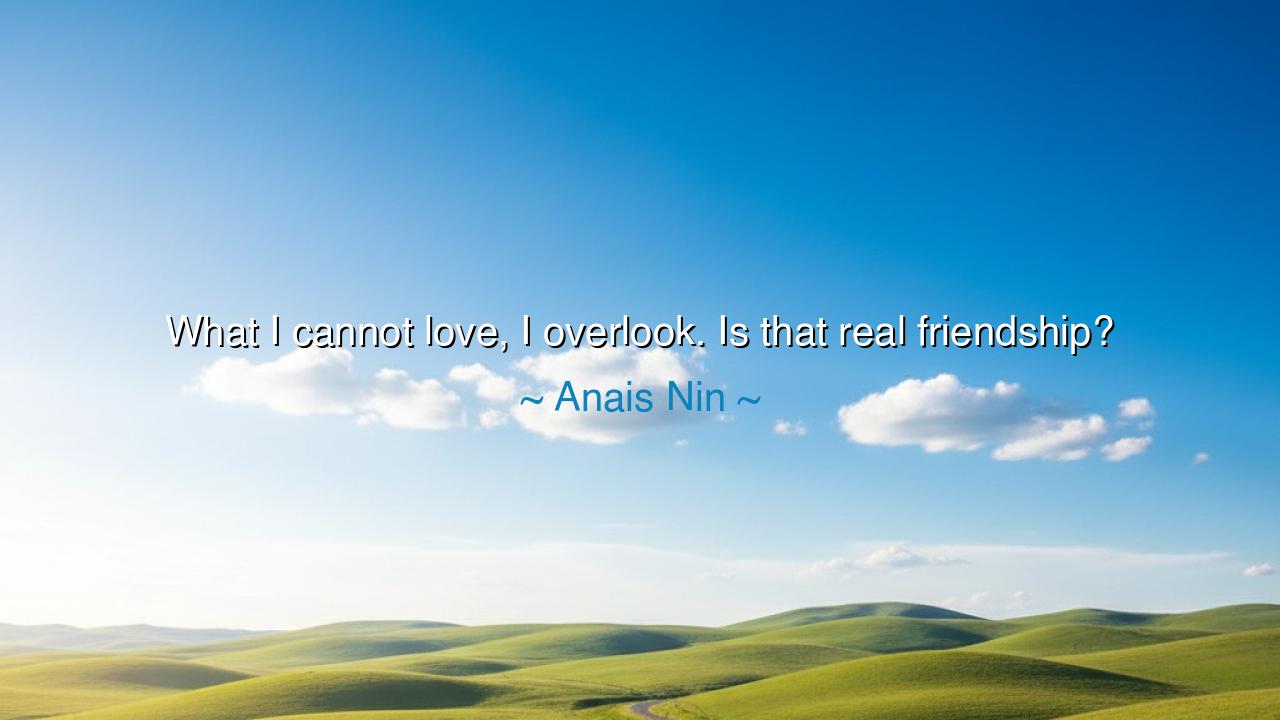
What I cannot love, I overlook. Is that real friendship?






In the haunting and introspective words of Anaïs Nin, we find a question that cuts to the very heart of human connection: “What I cannot love, I overlook. Is that real friendship?” Few sentences contain such quiet fire. Nin, that fearless explorer of the inner world, does not offer an answer but opens a wound—one that compels us to look within ourselves. For here she confronts the great tension between love and indifference, between the effort to understand and the ease of avoidance. Her question asks: if we ignore the flaws and struggles of those around us, if we turn our gaze away from what is difficult to love, can we still claim to be a friend?
The origin of these words lies in Nin’s lifelong study of the human spirit. A diarist, thinker, and poet of emotion, she lived among artists and dreamers, souls who sought beauty yet wrestled with imperfection. Through her own relationships—often intense, fragile, and deeply honest—she came to see that true connection requires not idealization, but acceptance. In the salons of Paris and New York, she witnessed friendships that thrived on charm and convenience but faltered in the face of truth. Thus her question is both confession and challenge: friendship that depends on selective sight is not friendship at all.
For to overlook is to refuse to see. Many believe that kindness means silence in the face of weakness—that to maintain peace, we must ignore the shadows in those we love. But Nin’s wisdom tells us otherwise. Real friendship does not turn away from imperfection; it looks upon it with compassion. To love only what is easy, what is pleasing, is to love an illusion. The friend who sees your flaws and still stays—that one touches eternity. For in the act of seeing another fully, both their light and their darkness, and choosing to remain, the soul practices the purest form of love: acceptance without blindness, truth without judgment.
Consider the friendship between Samuel Johnson and James Boswell. Johnson, a man of towering intellect but stormy temper, could be harsh, melancholy, and impatient. Boswell, his devoted companion, recorded all of it—his brilliance and his bitterness alike. Yet through this unflinching honesty, their bond endured and deepened. Boswell did not overlook Johnson’s faults; he loved him through them. Johnson, too, saw Boswell’s vanity and weakness, but cherished him nonetheless. Their friendship, preserved in history, stands as a testament to Nin’s ideal: that to love truly is not to overlook, but to embrace the whole.
In her question, Anaïs Nin also speaks to the modern heart—the heart that fears discomfort and chooses silence over truth. In an age that prizes harmony over depth, we often mistake politeness for friendship. We flatter, we nod, we turn our eyes away. But the ancients knew that love without honesty is a hollow thing. As the philosopher Aristotle said, “A friend to all is a friend to none.” True friendship is not built upon avoidance but upon courage—the courage to see and still care, to speak and still remain.
There is, too, a profound moral weight in Nin’s reflection. If we only love what pleases us, we become self-centered in affection—we use friendship as a mirror, seeking only reflections that flatter us. But when we love what is difficult to love, we transcend the self. We learn patience, empathy, and humility. Friendship becomes not a transaction of comfort but a journey of growth. In seeing the whole of another person, we come to understand more deeply our own humanity.
And so, my child, take heed of Anaïs Nin’s quiet question—it is not merely about friendship but about the soul’s capacity to love. Do not mistake overlooking for kindness; it is the cold mercy of detachment. Instead, learn to see with the eyes of compassion. When a friend falters, do not turn away in silence. When they err, do not erase them from your heart. Love is not blind—it is brave. Friendship that endures does not hide from truth; it stands within it.
Thus, let your friendships be living mirrors of truth and grace. See others not as perfect, but as whole. Speak gently, forgive readily, and love deeply. For when you can look upon what you cannot easily love and still open your heart, you will have found what Anaïs Nin sought: the rare and sacred friendship that is real, honest, and everlasting.






AAdministratorAdministrator
Welcome, honored guests. Please leave a comment, we will respond soon